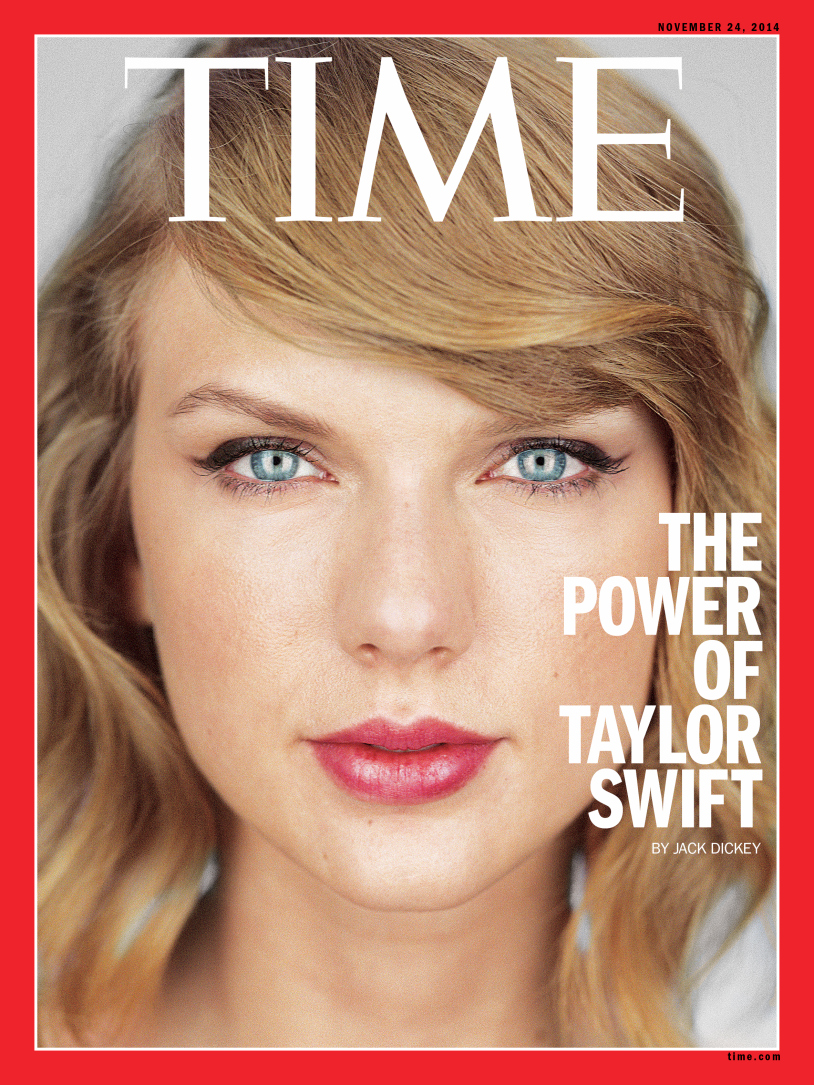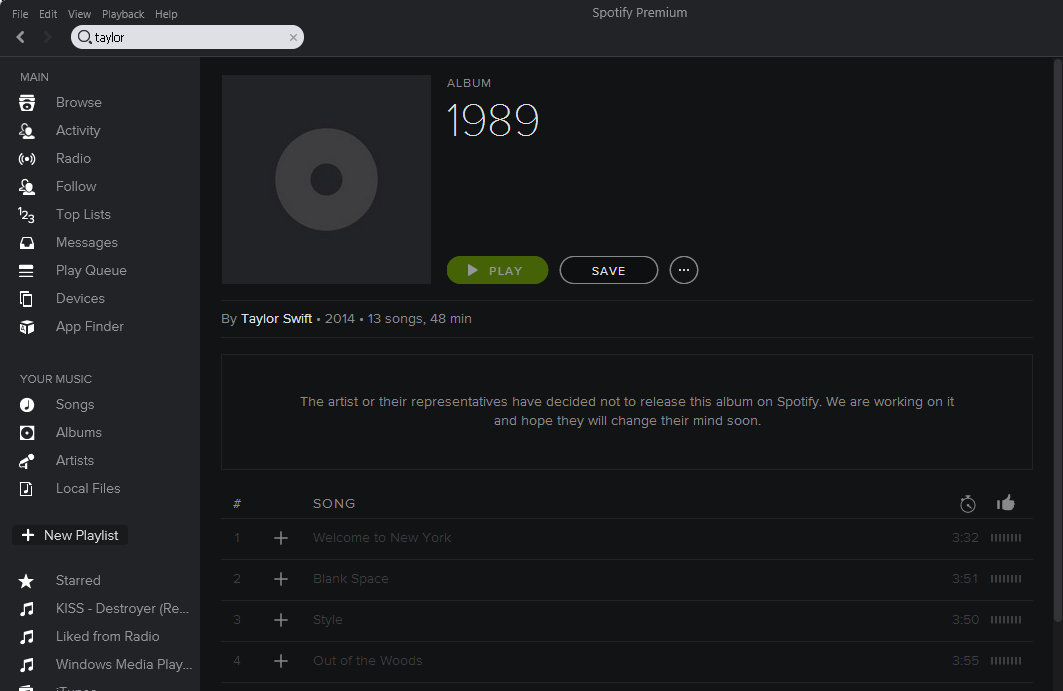
Taylor Swift’s withdrawal of her discography from Spotify continues to rattle down the halls of the music industry. BOB GORDON reports.
‘Imma let you finish, but…’
When Kanye West invaded the stage at the 2009 MTV Video Music Awards to do some unsolicited batting for Beyonce during the ‘Best Female Video’ presentation, no one would have thought that the doe-eyed and utterly frozen actual winner of the award would have so much sway in the international music industry only five years later.
These days Taylor Swift is an industry unto herself. With 71 million followers on Facebook, 46.9 million on Twitter and almost 14 million on Instagram. Her largesse as a pop cultural figure/industry persona is such that Track 3, a recording of eight seconds of static, recently saw Swift topping the iTunes Canada chart. It wasn’t exactly a Warholian gesture, however, blame a glitch on iTunes Canada’s part. In any case, enough people purchased it for $1.29 to take it to the toppermost.
No matter. When Swift’s full album, 1989, was released only hours later, it immediately debuted at #1 on the Billboard 200 albums chart, selling 1.287 million copies in its first week. Impressive, but what was more so is the fact that 1989 topped the chart with the largest sales week for an album since 2002. That album was Eminem’s The Eminem Show and was released around the same time a 12 year-old Swift had written her very first song, Lucky You.
According to Billboard, 1989 also immediately became the year’s second largest selling album, behind the all-conquering soundtrack for Disney’s animated juggernaut, Frozen (3.5 million sold since its release 12 months ago). Given Swift has already sold half that in a week, it’s not difficult to see how that’s going to play out.
Which is why, soon after the new LP’s release, Spotify was rocked by Swift’s decision to pull all her catalogue from the streaming service -including, of course, 1989 – citing low royalty payments and an overall devaluing of music.

Her views hardly came out of nowhere, writing in an op-ed piece for the Wall Street Journal in July, Swift’s position seemed pretty clear.
‘Music is art, and art is important and rare. Important, rare things are valuable. Valuable things should be paid for. It’s my opinion that music should not be free, and my prediction is that individual artists and their labels will someday decide what an album’s price point is. I hope they don’t underestimate themselves or undervalue their art’.
By the end of 2013, the Stockholm-based Spotify had 24 million users across 32 territories. The company now estimates it at 40 million.
Consider that in the 30 days leading up to her decision to withdraw, Swift had 16 million plays on Spotify and had appeared on 19 million user playlists. Put simply, Swift makes a difference, and Spotify saw fit to respond, doing so with a blog entry on November 3.
“We hope she’ll change her mind and join us in building a new music economy that works for everyone,” the post noted.
“We believe fans should be able to listen to music wherever and whenever they want, and that artists have an absolute right to be paid for their work and protected from piracy. That’s why we pay nearly 70% of our revenue back to the music community.
“PS – Taylor, we were both young when we first saw you, but now there’s more than 40 million of us who want you to stay, stay, stay. It’s a love story, baby, just say, Yes.”
If quoting the singer/songwriter’s own words by way of wooing her back didn’t seem at all creepy and desperate, the further step of curating several playlists featuring song titles by the likes of the Red Hot Chili Peppers, Taylor, Pinhead Society, Epic Connection, DJ Dodger Stadium, The Telescopes and Utenzil to reveal as a message to Swift sealed it.
‘Hey Taylor, we wanted to play your amazing love songs and they’re not here right now. We want you back with us and so do your fans’.
Eww. Swift, unsurprisingly, remains unmoved. She’s busy selling actual albums and announcing a world tour (including Australia) in 2015.
Naturally, this has since sparked industry and cultural debate that isn’t likely to subside given that music streaming severely affects the incomes of artists earning many millions less per year than Taylor Swift. Even one who’s earned more, Bono from U2, claimed that their current album, Songs Of Innocence, was mass-gifted via iTunes partially for fear that it might not get heard. “There’s a lot of noise out there,” he stated in a fan video Q&A. “I guess, we got a little noisy ourselves to get through it.”
In days following, Bono has since referenced Swift’s characterisation of Spotify as being a “grand experiment” (she didn’t want to be a part of), by saying “Let’s experiment. Let’s see what works,” at a Web Summit conference in Dublin.
That Swift is making a salient point and being heard on it might, optimistically, be a step in a positive direction for artists who simply want to be able to earn a living so that they can simply keep doing what they do. And if that sounds a little cotton-candy-ish, remember you are reading an article about Taylor Swift, after all.
Opinions on this continue to be varied. Foo Fighter Dave Grohl, the reigning Eddie Everywhere, was thinking mainly about his own band.
“Me personally? I don’t fucking care,” he told UK mega-site, Digital Spy. “That’s just me, because I’m playing two nights at Wembley next summer. I want people to hear our music. I don’t care if you pay $1 or fucking $20 for it; just listen to the fucking song. But I can understand how other people would object to that.”
Spotify founder, Daniel Ek, has claimed that Swift could make up to US $6 million a year. This earned a rebuke from her manager, Big Machine Music CEO, Scott Borchetta, saying that her catalogue had earned less than half a million dollars in the previous 12 months. For while Spotify may have 40 million or so users, it seems there’s only 12.5 million paid subscribers and it’s the free tier that’s making the difference to Swift, who remains on services such as Vevo, Rdio and Beats.
“With Beats Music and Rhapsody you have to pay for a premium package in order to access my albums,” Swift told Time magazine. “And that places a perception of value on what I’ve created. On Spotify, they don’t have any settings, or any kind of qualifications for who gets what music. I think that people should feel that there is a value to what musicians have created, and that’s that.”
However, overnight it transpired that Swift has sided with Google’s new YouTube Music Key, recently launched utilising a model not unlike Spotify’s. UK singer/songwriter/activist, Billy Bragg, was quick to call her on it via his Facebook page.
“Given that this year is the first to fail to produce a new million selling album, I can understand Taylor Swift wanting to maximise her opportunities with the new record,” Bragg noted, “and it worked: she shifted 1.28m copies of 1989 in the first week of sale.
“But she should just be honest with her fans and say ‘sorry, but (Google co-founder) Sergey Brin gave me a huge amount of money to be the headline name on the marquee for the launch of YouTube Music Key and so I’ve sold my soul to Google’.”
Swift, meanwhile, is nowhere near alone on the Spotify scenario, with artists such as The Beatles, Thom Yorke/Radiohead, The Black Keys, AC/DC, Coldplay, David Byrne, Beyonce – who has previously granted access to her releases after a ‘window’ period – and others having downright rejected the platform or had run-ins with it. US country music star, Jason Aldean, last week pulled his new album from the service as well.
In November, 2013, former X-Press Magazine Editor, Julian Tompkin, conducted a rare interview at Spotify’s Stockholm HQ with Jonathan Forster, the service’s General Manager for Europe.
“We’re making investments to support a company that has tens or hundreds of millions of users all over the globe, not just to be a very profitable and loved by the industry Swedish music streaming service, which we could be today,” Forster said, who at the time admitted that user numbers remained frustratingly low.
His next comment, ironically, echoed what so many musicians say in relation to streaming services.
“It’s hard, and it’s always been hard to make a huge living doing the thing you love,” he stated. “It’s tricky. We don’t have all the answers. It’s never been that easy for artists; I think there’s a myth that it is. We often say in the start-up world the best entrepreneurs are the ones that didn’t give up.”
‘Imma let you finish…’ yelped Kanye West, interrupting Swift’s victory speech that (seemingly) long ago night at the MTV Video Music Awards.
Well Yeezy, it appears that Taylor Swift isn’t finished yet, clearly not by a long-shot.